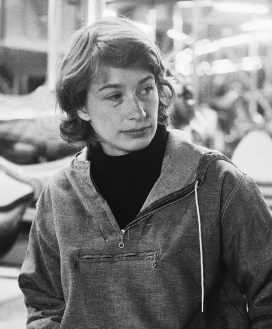
Mary Oliver’s Deep, Direct Love for the World
“The utmost of ambition,” Robert Frost once wrote, “is to lodge a few poems where they will be hard to get rid of”: not on university syllabi but in the memory of a generation. Few poets achieved that ambition more evidently, or more obviously, than Mary Oliver, who died, in Florida, on Thursday, at eighty-three. Though she grew up in Ohio and spent her last years in warmer climes, Oliver and her poetry cleaved closely for most of her adult life to Truro and Provincetown, Massachusetts, to the rocks, birds, mollusks, stunning sunrises, roaming mammals, and thin forests of Cape Cod.
That environment gave rise to poem after poem and book after book (nearly thirty, all told) of secular psalms, inquiries into nature, and reasons to go on living. “What is it you plan to do / with your one wild and precious life?” The question—a good one—that finishes off “The Summer Day” may stand alongside “ ’Tis better to have loved and lost” in the annals of sententiae, things much of a generation keeps telling itself, in photo captions, signatures, and subject lines, on Facebook and Twitter and Instagram, and on paper. (If I could say so without implying any irony, I’d call it a meme.) Other lines and sentences seem almost as inescapable. “You do not have to be good,” begins “Wild Geese”; “You only have to let the soft animal of your body / love what it loves.” Elsewhere: “Fill your hands with the mud, like a blessing.” “My work is loving the world.”
Oliver offered a seriousness not tied to a religious orthodoxy, a way to find the numinous through poetry and the outdoors, to avoid dwelling on crowds, modernity, the economy, and their loud demands. It was a way to use words, as she put it in “Sleeping in the Forest,” to dive into some of the “small kingdoms breathing / around me.” And yet these friendly profundities, so widely cherished, so truly useful to so many readers, were not her only tone. The same poet advised you more whimsically to “put a / bracelet on your / ankle with a / bell on it and make a / little music for / the earth beneath your foot.” At her best, she treated her forest dwellers and beach creatures less as religious icons than as quiet friends. “The Sunflowers,” in the poem of that name, “have wonderful stories / of when they were young— / the important weather, / the wandering crows.” Another famous poem—the titular poem in 2008’s “The Truro Bear and Other Adventures,” though first published in 1979, in “Twelve Moons”—delights to imagine a solitary bear, “lucky,” “clever,” “learning to stay away / from roads and houses.”
Oliver was not primarily known as a lesbian poet, nor as one who had found human love early—found it, moreover, long before contemporary gay liberation, long before it could be publicly consecrated or declared. But she did those things, too. Oliver shared her Provincetown life for decades with the photographer Molly Malone Cook, who informed some poems but became unmistakable, unavoidable, to many of Oliver’s readers only after Cook’s death, in 2005. An exceptional late poem with the elongated title “Coyotes in the Dark, Coyotes Remembered” remembers how Oliver, upon hearing two voices outdoors she thought to be coyotes, felt “thrilled / to be granted this secret, / that the coyotes, walking together / can talk together.” In fact, she heard “two young women, two-legged for sure / and not at all aware of me,” “two maidens of the wilderness,” who found in each other the grace that Oliver’s verse sought outside the human form. The ache is perhaps generational, and ancient: What kind of writer would Oliver have become if she had been able to be one of them?
But she did not mope about such things. The readers who cherished Oliver’s many volumes—who made her one of the two or three best-selling poets in the United States, not for one volume but over many years—looked to her for advice about how to live, how to take moments not as tokens to be exchanged for later achievement but as and for themselves. “What I want in my life,” she announced, “is to be willing / to be dazzled,” and Oliver’s fans could be dazzled along with her. Oliver’s late work can sound like part of a liturgy: “Have I experienced happiness with sufficient gratitude? / Have I endured loneliness with grace?” Such poems turned up in actual liturgies, read from actual pulpits, often: more than one writer has dubbed her “the unofficial poet laureate” of the Unitarian Universalist denomination.
The earlier books bring her closer to older poets, in a line of epiphanic nature poetry that has long preferred animals, any animals, and flowers, any flowers, to Homo sapiens. Sometimes she sounds like the early Theodore Roethke; at other times, like D. H. Lawrence, or like her Provincetown neighbor Stanley Kunitz, to whom she devoted a poem with his name in the title: “I used to imagine him / coming from the house, like Merlin,” it opens.
For her career shape, and her reception, a better model might be Edna St. Vincent Millay. The teen-aged Oliver showed up one day at the Millay estate, in upstate New York, agreed to work on the papers with Millay’s sister, and ended up living there for “six or seven years.” As with Millay, the fact of her popularity may have discouraged critical interest; as with Millay, her gender, and the gender of her biggest fans, has shaped her reception in some fairly obvious ways. But (as with much of Millay) there is another sense in which the poems just do not need critics: they try very hard to attain the directness of sunlight, the refreshing qualities of spring water and fresh bread, to be good for you without needing you to seed them, peel them, dice them, or process them further first.
Not all the readers of poetry in America found ourselves in Oliver’s large audience. But those of us halfway in or wholly outside it, if we are serious about the powers our art form can hold, ought to acknowledge what that audience sought. Oliver’s decades of litanies and rediscoveries provided so many readers with what Kenneth Burke called “equipment for living,” tools to fight gloom, to open the front door, to lead wilder or more precious lives. They also provided advice against selfishness, against self-centeredness, against the idea that experience or authority or cleverness could make you a better person than the rest, or give you the answers that everybody needs. Those answers—and Oliver was usually sure they existed—might be found in owls at dusk, in beach roses, in brief words with one favorite person, in tides on the sand, in the tracks of bears, in the contemplation of wild geese. No wonder so many readers lined up, for book after book, to hear what she wanted to say.


